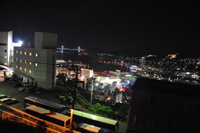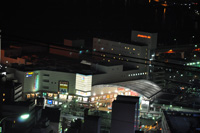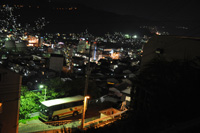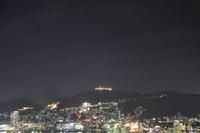 A small fishing village secluded by harbors, Nagasaki enjoyed little historical significance until contact with European explorers in 1542, when a Portuguese ship landed nearby, somewhere in Kagoshima Prefecture. The Navarrese Jesuit missionary St. Francis Xavier arrived in another part of the territory in 1549, but left for China in 1551 and died soon afterwards. His followers who remained behind converted a number of daimyo (feudal lords). The most notable among them was Ōmura Sumitada, who derived great profit from his conversion to the "Kirishitan" religion through an accompanying deal to receive a portion of the trade from Portuguese ships at a port they established in Nagasaki in 1571 with his assistance.
A small fishing village secluded by harbors, Nagasaki enjoyed little historical significance until contact with European explorers in 1542, when a Portuguese ship landed nearby, somewhere in Kagoshima Prefecture. The Navarrese Jesuit missionary St. Francis Xavier arrived in another part of the territory in 1549, but left for China in 1551 and died soon afterwards. His followers who remained behind converted a number of daimyo (feudal lords). The most notable among them was Ōmura Sumitada, who derived great profit from his conversion to the "Kirishitan" religion through an accompanying deal to receive a portion of the trade from Portuguese ships at a port they established in Nagasaki in 1571 with his assistance.
Urakami is a section of Nagasaki where Christians secretly retained their faith during a phase of significant persecution, and which was decimated by the atom bomb. Urakami Cathedral has many artifacts from these two periods in Nagasaki history and was a site of John Paul II's visit to Japan. Nagasaki today has a thriving  Catholic population and is a pilgrimage destination in this part of Asia. In addition to the Japanese martyrs and St. Francis Xavier, Maximilian Kolbe ministered in Nagasaki six years before his execution in Auschwitz. The oldest Catholic churches in Asia are found in the Nagasaki area.
Catholic population and is a pilgrimage destination in this part of Asia. In addition to the Japanese martyrs and St. Francis Xavier, Maximilian Kolbe ministered in Nagasaki six years before his execution in Auschwitz. The oldest Catholic churches in Asia are found in the Nagasaki area.
The gospel mandate to evangelize requires Christians to go into the world to preach and teach about Jesus with a view to everyone having the opportunity to have a relationship with and be saved by him. The integration of Christian faith with culture has become, in its best examples, a melding of the joys, hopes, griefs, and anxieties of the church and people. While this may be strong language, when the church or people in the name of the church have practically speaking seen evangelization and conquest as synonymous can this be viewed as a type of spiritual rape?
 When a Christian denomination is the underdog, espeially as it is in Nagasaki where there is a history of persecution and martyrdom and where, today, Christianity is still a small minority, it is impossible to claim that conquest has taken place in the name of religion. Perhaps the Portugese settlers had something else in mind, but that is not how it has played out here. My impression of the church in Nagasaki, the only place in Japan where Catholicism has especially deep roots, there are obvious ways that the faith has grown more organically within a discrete or unique cultural context. The church here feels humble, which seems to contribute in a particular way to its being truly faithful and authentic.
When a Christian denomination is the underdog, espeially as it is in Nagasaki where there is a history of persecution and martyrdom and where, today, Christianity is still a small minority, it is impossible to claim that conquest has taken place in the name of religion. Perhaps the Portugese settlers had something else in mind, but that is not how it has played out here. My impression of the church in Nagasaki, the only place in Japan where Catholicism has especially deep roots, there are obvious ways that the faith has grown more organically within a discrete or unique cultural context. The church here feels humble, which seems to contribute in a particular way to its being truly faithful and authentic.
I say that I have never been one to hit people over the head with religion or with my personal beliefs. That doesn't mean that I haven't secretly wanted everyone to believe what the church believes. Early in my seminary career and priesthood I was smug about having found the right path and assumed that, even in the particulars, everyone else should take the same route as I did. When my discernment to become a priest began to mature I suggested in my Ministerial Platform that my goal was to lead others where I myself had been led. I might still say that, but what I mean by that statment is different today, even beyond nuance, since my calling as a priest continues to evolve. I am comfortable being a Christian every day and a Catholic maybe one day less than that. I still like to be right but I hope I'm no longer smug about these things.
 Is there anything in the teaching of Christ that suggests that personal or communal faith is something monolithic planted into a culture and then forced to grow? His invitation to discipleship in the gospels seems more like a proposal than an ultimatim. Yes, the gosples certainly describe expectations, but even there they are presented not in a formulary or calcified sort of way.
Is there anything in the teaching of Christ that suggests that personal or communal faith is something monolithic planted into a culture and then forced to grow? His invitation to discipleship in the gospels seems more like a proposal than an ultimatim. Yes, the gosples certainly describe expectations, but even there they are presented not in a formulary or calcified sort of way.
This is an unnuanced assessment, but in many respects it seems that bishops today make many of their pronouncements from a defensive or fearful posture. For this and other reasons, episcopal pronouncements are viewed as impositions rather than as invitations. Inculturation refers to the various exchanges which naturally take place between the church and a given culture, but more often today these exchanges are spoken of as taking place within particular ethnic contexts where articulation or reception of the gospel are less than graceful. Does this mean that God's grace is defective or is it, rather, our methods?
 I like seeing the shrine honoring the Catholic Martyrs in Nagasaki sitting on the edge of a Buddhist shrine and cemetery. It's probably a function of being comfortable with what I know. I don't mind hearing about how some rituals of Buddhist or Shinto origin have made their way into Catholic homes, and which have little to no impact on the substance of that Catholic faith. People of different religions can and do live side by side peacefully and make vibrant contributions to each other's lives.
I like seeing the shrine honoring the Catholic Martyrs in Nagasaki sitting on the edge of a Buddhist shrine and cemetery. It's probably a function of being comfortable with what I know. I don't mind hearing about how some rituals of Buddhist or Shinto origin have made their way into Catholic homes, and which have little to no impact on the substance of that Catholic faith. People of different religions can and do live side by side peacefully and make vibrant contributions to each other's lives.
We have inculturation issues of another type in the United States, and I have them in my parish. The church is making a heavy-handed attempt at self-preservation while the prevailing culture is also often hostile. This dynamic, taken as a whole, looks nothing like the interaction between Christ and the people of his day. Jesus appears to have been frustrated with opposition, but did he change his fundamental approach when he encountered it? I can give examples of where I am heavy-handed with people because I feel specially enlightened. This never wins converts, nor does it engender an awareness of or attraction to a person who I believe is the author and source of life.



